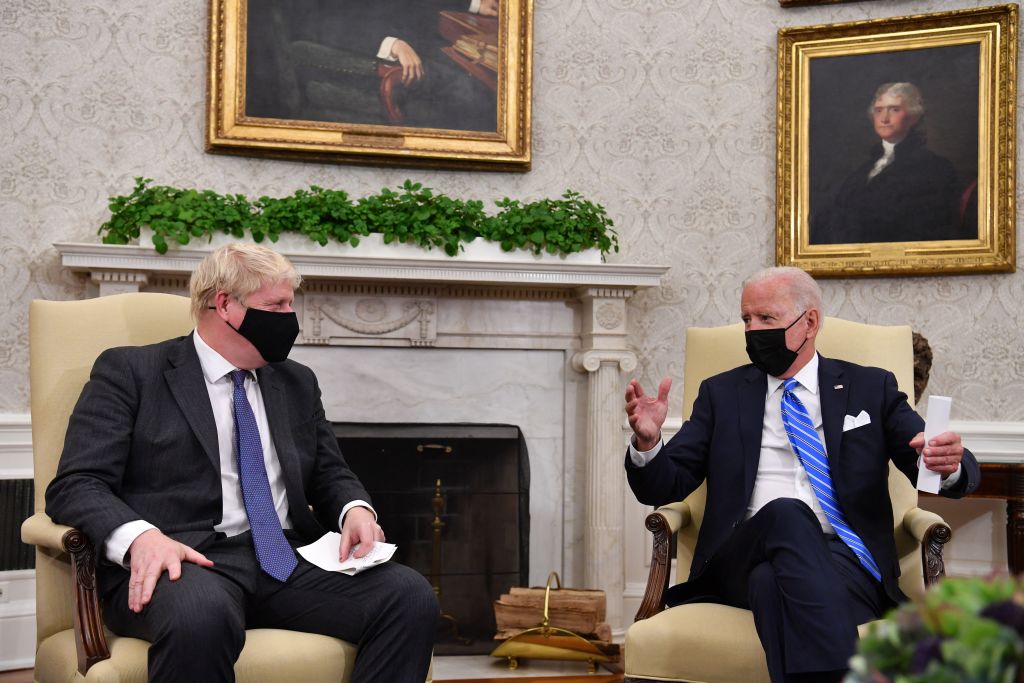It’s been said far too many times that Boris Johnson and Donald Trump have a lot in common. Trump himself called the Prime Minister ‘Britain Trump’ — to Donald’s mind, the greatest compliment any man could give.
Others use the Trump-Boris analogy to pour scorn. French newspapers have called him ‘mini-Trump’. Or ‘Trump with a thesaurus,’ is how Nick Clegg, the former UK deputy prime minister who now works for Facebook, put it. To most international media, Brexit and Trump, and therefore Boris and Trump, were part of the same horrid phenomenon. Both men were called populists, nationalists, demagogues, liars — yet they kept winning.
But now Trump is gone and Boris is still prime minister, and the Trump-Boris comparisons seem dated and silly. Yesterday, Boris Johnson met with President Joe Biden, and it’s becoming clear that he has more in common with America’s 46th president than he ever did with its 45th. Boris is in fact a mini-Biden, even if both men would recoil at the thought.
Biden and Johnson are together mega-spending centrists with highly malleable values. Both men blithely dismiss concerns about inflation as they set about trying to blast their way out of the COVID-19 crisis with ever greater sums of borrowed money. Both men have an illegal immigration problem they refuse to talk about for fear of sounding racist.
Boris and Biden don’t stand for much beyond the pursuit of power, which makes them effective as electoral campaigners but less so in office. They both regurgitate focus-grouped slogans such as ‘build back better.’
They are also both quite willing to court nationalist sentiments — whether that be co-opting Trump’s America First Agenda in the case of Joe, or seizing on Brexit in the case of Boris.
At same time, the prime minister and the President are also veteran ‘greenwashers’, who see the political upsides of pursuing very expensive global green policies. For Biden, ambitious policies to combat climate change enable him to present himself as the ‘transformational’ Commander-in-Chief; the leader he promised the left of his party he would be.
For Boris, the hope is that his COP26 ‘net zero’ carbon emissions agenda makes him appeal to other world leaders like Biden, as well as attractive to metropolitan-minded voters who distrust him because of Brexit. (It also keeps his new wife happy.)
Boris and Biden also share the luck of having a fractured and muddled opposition. Trumpism in fact has more in common with Corbynism than with Brexit-era Toryism — because the Labour and Republican parties of the 21st century are far more alike than most Britons would care to admit. In the late 1990s and 2000s, both the Republicans and Labour pursued what is usually called neoliberal economics before finding themselves in power at the dawn of the 2008 financial crisis. Both parties were responsible for the horrendous and unpopular folly of the Iraq War.
These mistakes greatly damaged their appeal among lower-class voters and made them ripe for takeover by two very different-yet-similar figures in Trump and Corbyn. Corbyn never seized power, of course, but like Trump his controversial leadership plunged his party into an existential funk: do they go back to the retail politics of yesteryear or accept that anti-elitist radicalism is their future? Neither party has a good answer to that question, which makes them weak opponents to leaders in power.
In next year’s midterms the Republican party should prove that it has more residual strength than Labour. For now, however, Biden has profited from their incoherence and the contradictions in their messaging, just as Boris has with Labour.
But the lack of a successful opposition is not the same as success. What with energy crises, immigration headaches, cock-ups in Afghanistan and COVID confusion, Boris and Biden suffer from very similar problems in the minds of many voters. The over-riding impression is that they don’t know what they are doing.
This article was originally published on The Spectator’s UK website.


















